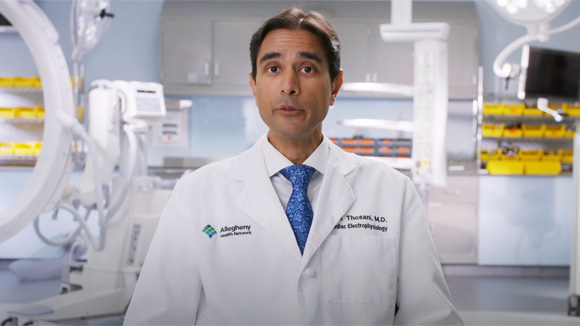Atrial Fibrillation (AFib or AF)
Atrial fibrillation (AFib) is a type of arrhythmia, or irregular heart rhythm, that can lead to serious heart conditions like blood clots and stroke. During AFib, the heart's upper chambers, or atria, beat irregularly and often rapidly. This can sometimes cause the two lower chambers, or ventricles, to also beat quickly and out of sync with the atria. When this occurs, it’s referred to as atrial fibrillation with rapid ventricular response (AFib with RVR). People with AFib are at risk of stroke, heart failure, and heart-related complications.
The Allegheny Health Network (AHN) Cardiovascular Institute provides timely diagnosis and expert treatment. Our heart rhythm specialists treat various complexities of arrhythmias.
Types of atrial fibrillation
Atrial fibrillation can have various characteristics and affect patients differently. Doctors classify AFib by how long it lasts. Your condition may change over time.
Paroxysmal atrial fibrillation
Paroxysmal atrial fibrillation comes and goes on its own. Episodes can last for minutes or up to several days.
Persistent atrial fibrillation
When atrial fibrillation is continuous, it’s considered persistent. Persistent AFib typically lasts longer than a week and may require medication or treatment to return the heart’s rhythm to normal.
Long-standing persistent atrial fibrillation
This means your AFib has lasted for more than a year and may be more difficult to treat. In this case, medication and regular treatment may not stop the AFib. Doctors may choose another form of treatment, such as ablation, to restore a normal heart rhythm.
Chronic atrial fibrillation
With this type of AFib, the arrhythmia can't be controlled with medications or procedures. Long-term medications are needed to control the heart rate and lower the risk of blood clots and stroke.
Atrial fibrillation vs. atrial flutter
Atrial flutter is related to, but not the same as, atrial fibrillation. Atrial flutter is an abnormal heart rhythm that most commonly occurs in the heart’s upper right chamber and is more electrically organized than atrial fibrillation. Atrial flutter is often found in patients who have atrial fibrillation. Patients with atrial flutter experience some of the same symptoms found in atrial fibrillation. As with atrial fibrillation, atrial flutter also has increased risk of stroke.
Atrial fibrillation symptoms and causes
What does AFib feel like? Some may not experience any symptoms, but signs of AFib for those who do may include:
- Heart palpitations.
- Chest pain.
- Shortness of breath.
- Dizziness or weakness.
- Fatigue.
Is AFib hereditary? While there are a small number of cases attributed to genetics, the most common causes of AFib are related to problems with the heart’s structure. Other contributing causes may include:
- Coronary artery disease.
- Heart attack.
- Congenital heart disease.
- Heart valve problems.
- High blood pressure.
- Lung diseases.
- Viral infections.
- Obesity.
- Untreated sleep apnea.
- Alcohol use.
- Tobacco use.

"One of the parts of our program that we're proud of, is that we are quite innovative and offer really cutting edge therapies for the treatment of atrial fibrillation and all other arrhythmias."
Amit Thosani, MD — Director, Cardiac Electrophysiology
How is atrial fibrillation diagnosed?
There are several ways a doctor can diagnose AFib:
Physical exam
AFib can be detected during a physical examination when your doctor listens to your heart with a stethoscope. To confirm the diagnosis, additional tests may be ordered.
Electrocardiogram (ECG or EKG)
An ECG is a quick and painless test that measures the electrical activity of your heart using electrodes placed on your chest. This will show doctors whether your heart is beating normally.
Consumer-grade heart monitors
Wearable devices such as smart watches or personal ECG monitors can alert you to an irregular heart rhythm. If an irregular rhythm is noted, you should follow up with your doctor for further evaluation and treatment.

"We perform our surgical procedures without the use of x-ray radiation which is unique and something we were really early in relative to other programs in the country."
Amit Thosani, MD — Director, Cardiac Electrophysiology
Atrial fibrillation treatment
AFib treatment involves measures to reduce the risk of stroke and the burden of symptoms. Treatment may include:
Medications
A combination of medications and blood thinners may be used to help return the heart’s rhythm to normal and reduce the risk of blood clots.
Cardioversion
During this procedure, a controlled electrical shock is delivered to your heart. The shock disrupts the electrical pulses causing the irregular heartbeat and restores the heart’s normal rhythm.
Ablation for AFib
Catheter ablation is a minimally invasive procedure. Your doctor guides thin wires or catheters through a blood vessel in your groin to reach your heart. Targeted energy is used to treat the heart tissue so that it no longer beats out of rhythm.
Surgical procedures
The Cox-maze procedure is performed during open-heart surgery or with minimally invasive techniques with a small incision in the right chest. Your cardiac surgeon uses a scalpel to scar heart tissue and removes the left atrial appendage as part of the procedure.
Left atrial appendage occlusion
The left atrial appendage is an area in the left upper chamber of the heart where blood clots often form when patients experience atrial fibrillation. Left atrial occlusion uses a permanent self-expanding device to seal off the heart’s left atrial appendage, preventing blood clots from causing a stroke.
Atrial fibrillation medications
Treating atrial fibrillation involves measures to reduce the risk of stroke. Medications may be prescribed to help restore a regular heart rate and rhythm, and can also be taken to prevent blood clots. AFib medications may include:
Rate controlling medications
Beta blockers such as metoprolol, calcium channel blockers such as Cardizem or diltiazem, and digoxin can be used to help control the heart rate in patients with atrial fibrillation. These medications may not be recommended for patients with heart failure or low blood pressure.
Antiarrhythmic medications
These medications are used to help maintain a normal heart rhythm. Individual patients respond differently to various antiarrhythmic medications and your doctor will address any potential side effects. Some medications require a two- to three-day stay in the hospital to start, while others require periodic blood tests, ECG, or X-rays. Your doctor will discuss the specifics of your medications with you.
Blood thinners
Blood thinning medications, or anticoagulants, are used to thin the blood and reduce the risk of clot formation. Medications such as warfarin or Coumadin may interact with food and other medications, requiring dietary changes and routine blood tests. Newer anticoagulants are now available, which interact less with food and medications while still preventing strokes. Anticoagulation therapy must be tailored to each individual patient. If you are unable to take a blood thinner due to bleeding or stroke, a procedure called left atrial appendage occlusion may be an option.
Life during AFib treatment
Once diagnosed and placed on a treatment plan, there are a few changes you can make to help improve your condition.
Lifestyle changes
Eat heart-healthy foods
Reduce foods high in sodium and increase your intake of fruits, vegetables, and whole grains.
Exercise regularly
Exercise daily and increase physical activity to maintain a healthy weight.
Quit smoking
Tobacco use can increase your risk of serious heart conditions and should be eliminated.
Limit alcohol
In patients with AFib, heavy alcohol consumption can trigger an irregular heart rhythm.
Follow your treatment plan
Take your medications as prescribed and have regular follow-up appointments with your doctor to stay on track.
Atrial fibrillation and COVID-19
According to the American Heart Association, the risk of complications from the COVID-19 vaccine is very small, even for people with heart conditions or for those who have had a stroke.
AHN Atrial Fibrillation Program
The AHN Atrial Fibrillation Program has a dedicated team of electrophysiologists, advanced practiced providers, and nurses who specialize in treating atrial fibrillation. Our personalized treatment plans include the most recent in medical management and minimally invasive surgical procedures.
We also work with multispecialty programs, such as:
Contact us
Call (412) DOCTORS (412) 362-8677 or request an appointment to learn more about AHN cardiovascular services.
-
Appointments
Cardiovascular Institute(412) DOCTORS
By accessing this video, I understand that I am leaving the AHN website and I will be re-directed to an external website operated by a third party platform provider. I acknowledge that the platform provider may collect personal information about me, and about the video that I view, on their platform and may use and disclose this information in accordance with its privacy policy. I agree that Allegheny Health Network is not responsible for the data collection and use practices of this third party.

